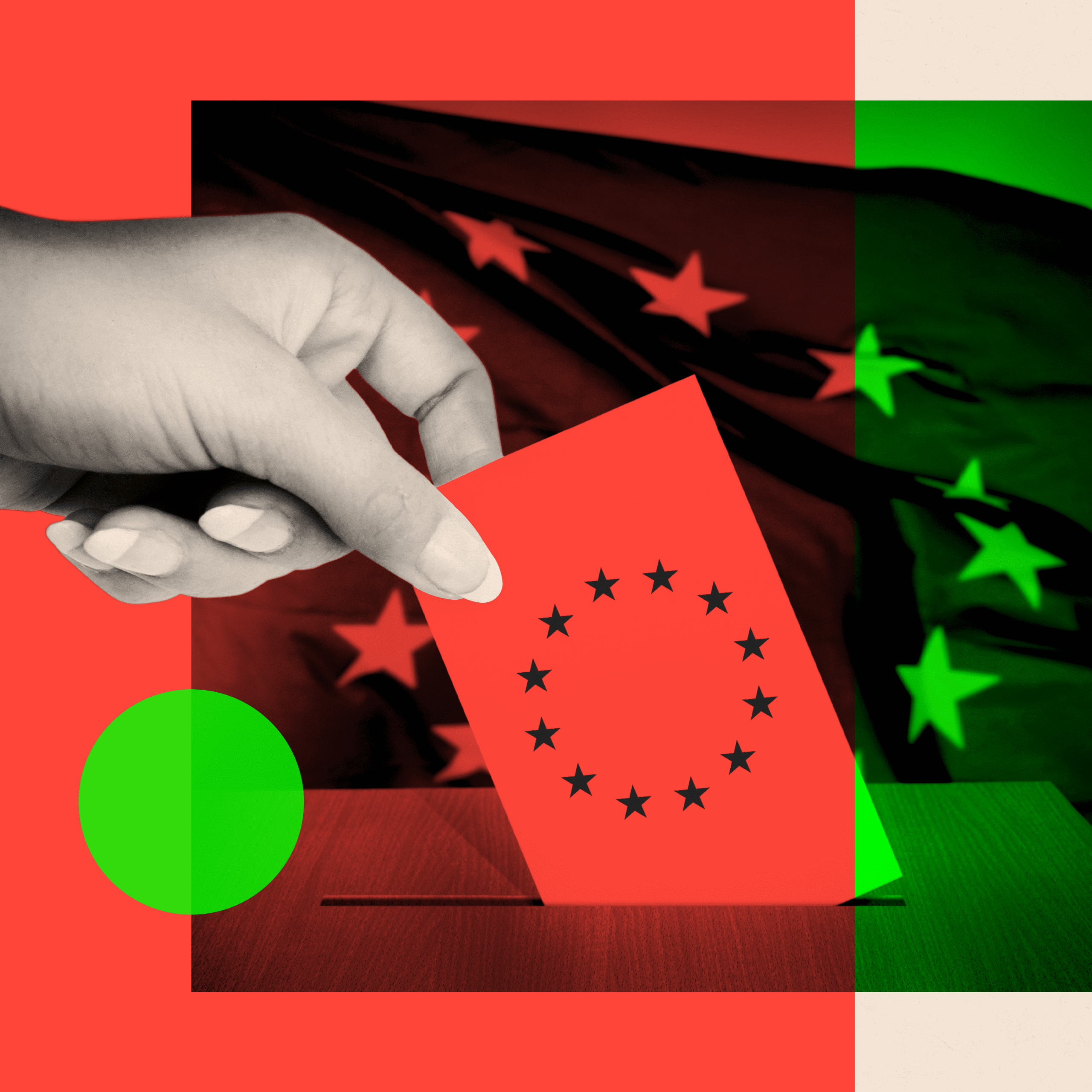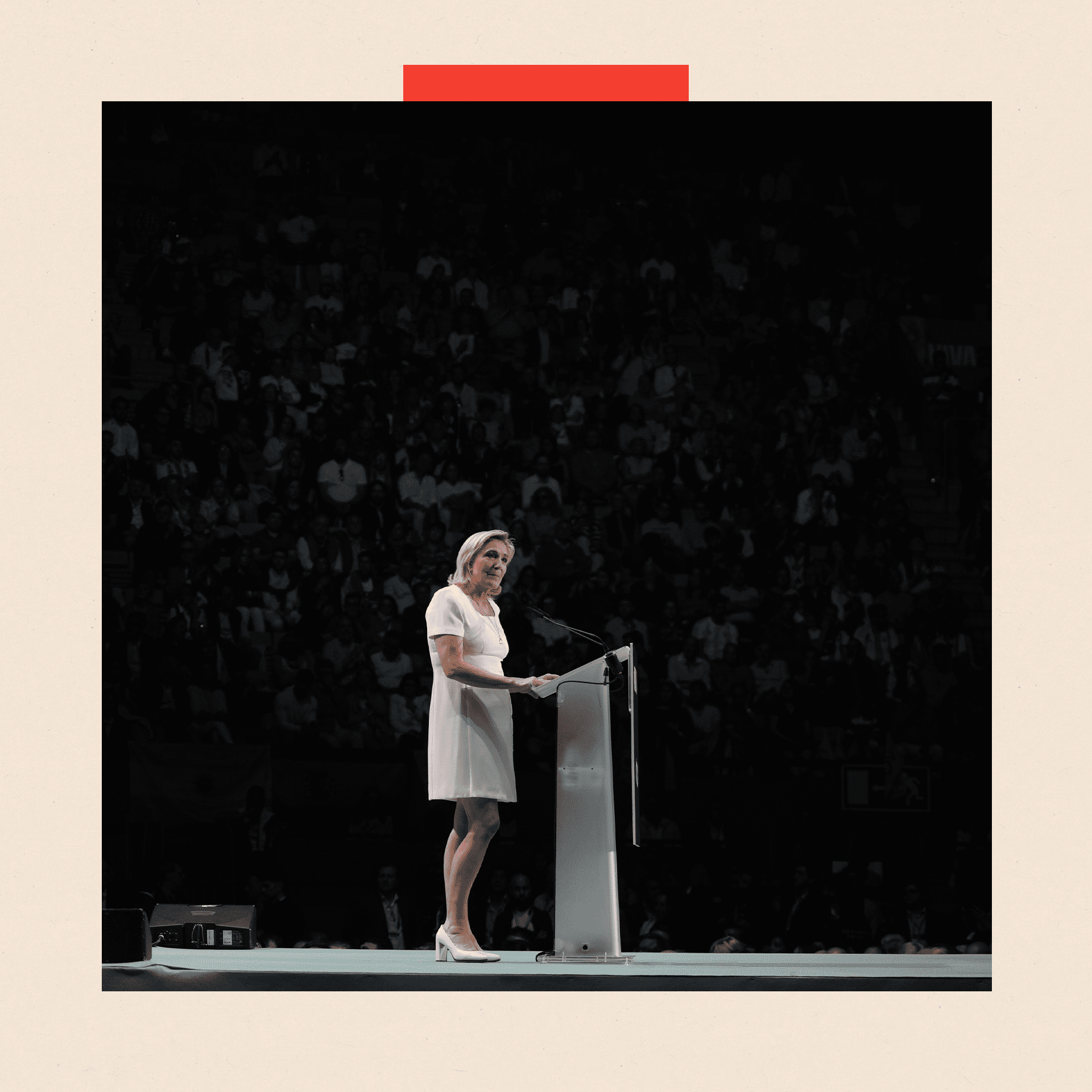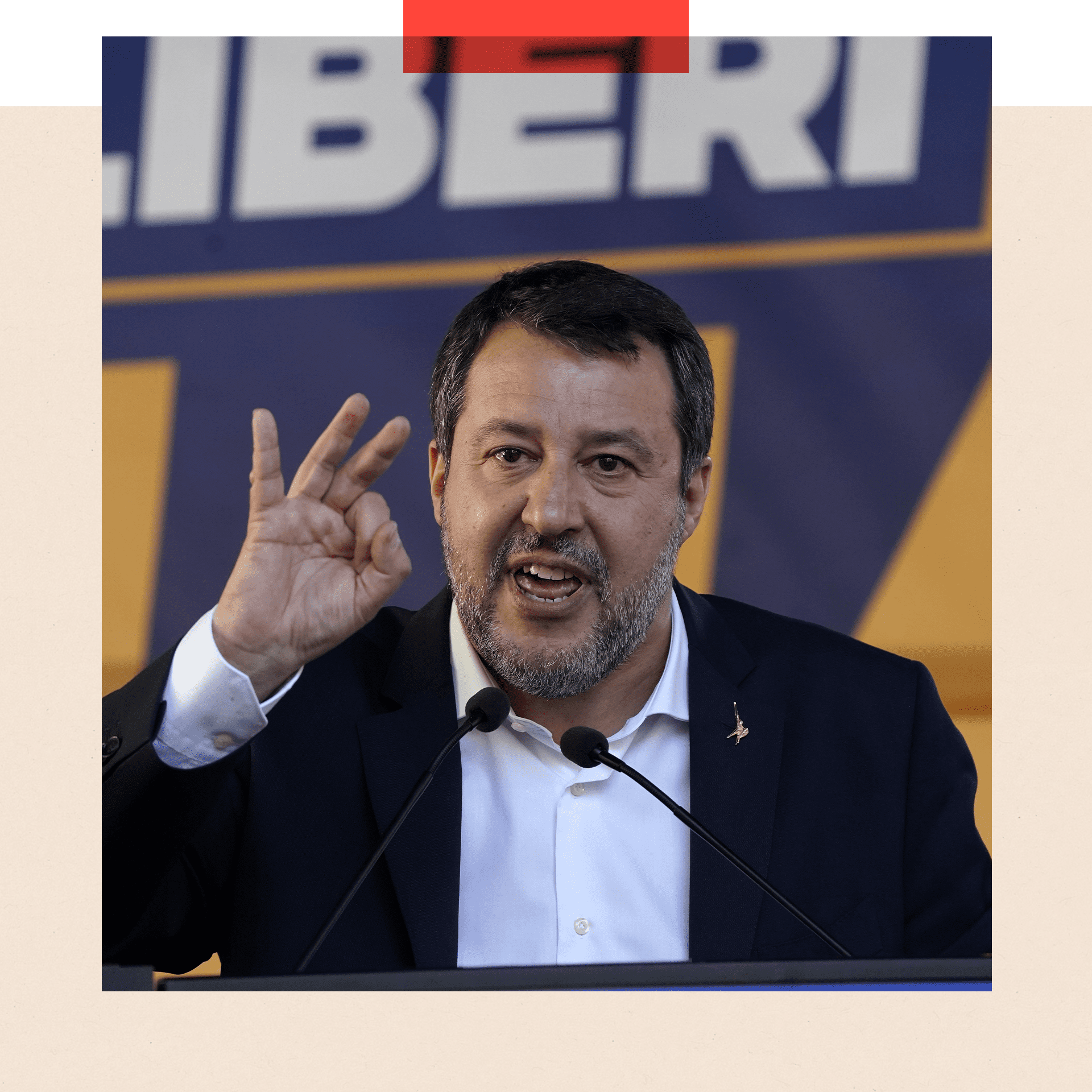
“The far right is on the march” is something you often hear said across Europe right now. “This feels like Europe of the 1930s.”
So perhaps it is no surprise that with 350 million people across the European Union currently voting for their direct representatives in the European Parliament, there’s nail-biting by many a Eurocrat in Brussels. But are fears - and media headlines - exaggerated?
Millennials and first-time Gen Z voters are among those predicted to pull rightwards. Figures gathered recently for the Financial Times newspaper suggest around a third of young French voters and Dutch under-25s, and 22% of young German voters, favour their country’s far right. This is a significant increase since the last European Parliament election in 2019.

Marine Le Pen's National Rally party is hoping to make gains
Far-right parties are predicted to take up to a quarter of the total seats, and if they do win big, the optics will be clear. But the granular detail of what impact it could have on life and policy-making in the EU is more nuanced.
And that is because the nationalist right itself is nuanced - different nationalist right politicians in different countries hold different positions. Some have toned down former far-rightist rhetoric to try to widen their appeal to voters.
So, what might change in Europe if the European Parliament swings to the right?
Push-back against green policies
The EU has long nursed a huge ambition - to be ahead of the rest of the world when it comes to the environment. But Europe’s voters are increasingly concerned about the cost of a green transition.
Take the recent mass farmers’ protests. Tractors from all over the EU descended on Brussels and the European Parliament, bringing them to a standstill. The protesters said EU and national environmental laws and bureaucracy were putting them out of business.
Nationalist-right parties in France, the Netherlands and Poland jumped on this bandwagon, spotting an opportunity to pitch their claim to be representatives of “ordinary people” against EU and national “out-of-touch elites”.
The result? The EU rolled back or rescinded several key environmental rules, including stricter regulations on the use of pesticides.
Environmentalists worry the EU has now avoided specifying how farmers should contribute to its vision of slashing 90% of emissions by 2040. They believe a shift rightwards in the European Parliament could mean more watering down or endless delaying of green objectives.
Voices for national sovereignty
Most European voters say they don’t want to leave the EU, though they have plenty of gripes about how it works. Instead, right-wing nationalist parties are promising a different EU - more power for nation states, less “Brussels interference” in everyday life.
If their voice gets louder in the European Parliament, it could make it harder for the European Commission to take on more competencies from national governments, like health policy.
Obstruction around asylum...
You’d think this would be an obvious one, and that a swing to the right in the EP would lead to tougher EU legislation on migration.
Take far-right leader in the Netherlands, Geert Wilders. His PVV party became the largest group in the Dutch parliament this autumn after national elections. He’s promised “the toughest migration law of all time”, and exit polls suggest the PVV will do well in this election.

But it’s worth bearing in mind that EU migration and asylum policy has already long been nicknamed Fortress Europe. A huge priority is to keep people out. There’s been a flurry of economic deals with non-EU countries like Tunisia, Morocco, Libya and Turkey to crack down on people-smugglers sending over economic migrants or asylum-seekers.
What a bigger grouping of the hard-right in the European Parliament could change, though, are so-called solidarity policies.
EU countries are each supposed to take a quota of asylum seekers, or at least pay significant contributions, to help fellow EU members like Italy and Greece, where most migrants land by people smuggler’s boat. But nationalist-right MEPs may refuse to play ball, as we’ve already seen with populist nationalist governments in Hungary and, until recently, in Poland.
…and enlargement
Russia’s full-scale invasion of Ukraine has prompted leaders across the EU to talk about making their “neighbourhood” more secure.
Not just by spending more on defence but by speeding up the process - or at least showing more concrete enthusiasm - for neighbouring countries to join the EU. I’m talking here about Ukraine, Georgia and western Balkan nations like Kosovo and Serbia, the latter being of great concern to Europeans because of its closeness to Moscow.
But the nationalist right is generally less than keen. They fear the costs of enlargement. A bigger EU, with more poorer countries in it, would likely need a bigger budget, with chunkier contributions from comparatively richer member states.
It would also mean members of the bloc who’ve received considerable EU subsidies like Romania, Poland and also French farmers (still the biggest single beneficiary of the EU’s Common Agricultural Policy) would probably no longer benefit. Hard to imagine them getting a look-in if massive, largely rural agricultural Ukraine - nicknamed the breadbasket of Europe - were to join the EU, for example.
What’s unlikely to change
Security and defence tends to be viewed as a hobby horse of the right, but in these days of conflict, most in the EU agree that defence spending is a priority. Their conviction has been hardened by the prospect of Donald Trump returning to the White House as US president.
Since World War Two, Europeans have looked to the US to have their back in terms of security. Just look at how pivotal Washington has been in providing aid to Ukraine.
But Mr Trump has been clear that if he wins the presidency come the US elections in November, Europe should take nothing for granted.
EU’s leaders are convinced that they need to be better prepared.
Europe’s nationalist right will remain split
Ukraine is a clear example of why generalising about the hard right as if it’s a uniform movement can be very misleading.
It’s true, hard-right parties scattered across the EU say they intend to change the bloc from the inside. If they win more MEPs this week and if they make it into more national governments, that gives them a bigger voice in the European Parliament, at key EU ministers meetings and at EU leaders’ summits.
Italy’s PM says fascism is ‘consigned to history’. Not everyone is so sure
- Published30 May 2024
Russia's economy is growing, but can it last?
- Published6 June 2024
Evan Davis: Successful entrepreneurs don’t worry about being different
- Published2 June 2024
But it’s also true the impact they have on the EU depends on how united those political parties are. Ukraine is one example where they are deeply split.
Strains inside Italy’s government, encapsulate these tensions. Matteo Salvini and his hard-right Lega Party is in coalition government with right-wing nationalist Prime Minister Giorgia Meloni of the Brothers of Italy group.
She is an avowed Atlanticist who has pledged ongoing military and economic aid to Kyiv. Mr Salvini, on the other hand, is more typical of hard rights nationalists in Europe: somewhat USA-sceptic, closer to Moscow - like Marine Le Pen’s National Rally party.

Matteo Salvini's Lega is a junior partner in Italy's coalition government
In the past, Matteo Salvini has been fond of posting photos on social media of his visits to Russia, including one famously showing him posing in front of the Kremlin, in a T-shirt emblazoned with the image of Vladimir Putin.
Another obstacle to the co-ordination of European hard-right parties is leadership. The nationalist right tends to favour outspoken, charismatic national leaders, proclaiming “Italy first” or “Make Spain great again” or “France for the French”, depending on the country they come from.
Italy’s Georgia Meloni won’t want to be told by France’s Marine Le Pen what to fight for in Brussels. Ms Le Pen would be unlikely to accept having her wings clipped by Hungary’s Victor Orban, and so on.
Who are the far right, anyway?
Part of the problem here is terminology. Who are the hard right? How far right-of-centre must your political grouping be to be labelled “far right”?
Right-wing nationalist supporters complain mainstream media and traditional politicians are too quick to use the term.
Italy’s Giorgia Meloni is a high-profile example of a former “far right” figure that has sought to become more mainstream, to attract a broader spectrum of voters.

Italian Prime Minister Giorgia Meloni delivers a speech ahead of the 2024 European Parliament elections
Where once she openly praised Italy’s former fascist dictator Benito Mussolini, now she cites former UK prime minister Margaret Thatcher as an inspiration. Marine Le Pen has tried to erase a reputation for racism and anti-semitism amongst her followers. And before the Dutch general election last year, Geert Wilders dropped the extreme anti-Islam attitude critics associated him with, to win big.
Muddying political definitions even further is that centre-right politicians across Europe have increasingly begun to ape “far right” rhetoric on hot button issues such as migration or law and order. By doing that, they hope to hold on to voters who might be attempted by the hard right.
This was the case with long-term prime minister of the Netherlands Mark Rutte, for example, and also France’s President Emmanuel Macron. His recent migration law was only passed in the French parliament with the support of the hard right. The French media debated whether Marine Le Pen had “won” - just as she’s hoping to do in this week European parliamentary election.
BBC InDepth is the new home on the website and app for the best analysis and expertise from our top journalists. Under a distinctive new brand, we’ll bring you fresh perspectives that challenge assumptions, and deep reporting on the biggest issues to help you make sense of a complex world. And we’ll be showcasing thought-provoking content from across BBC Sounds and iPlayer too. We’re starting small but thinking big, and we want to know what you think - you can send us your feedback by clicking on the button below.
Get in touch
InDepth is the home for the best analysis from across BBC News. Tell us what you think.

